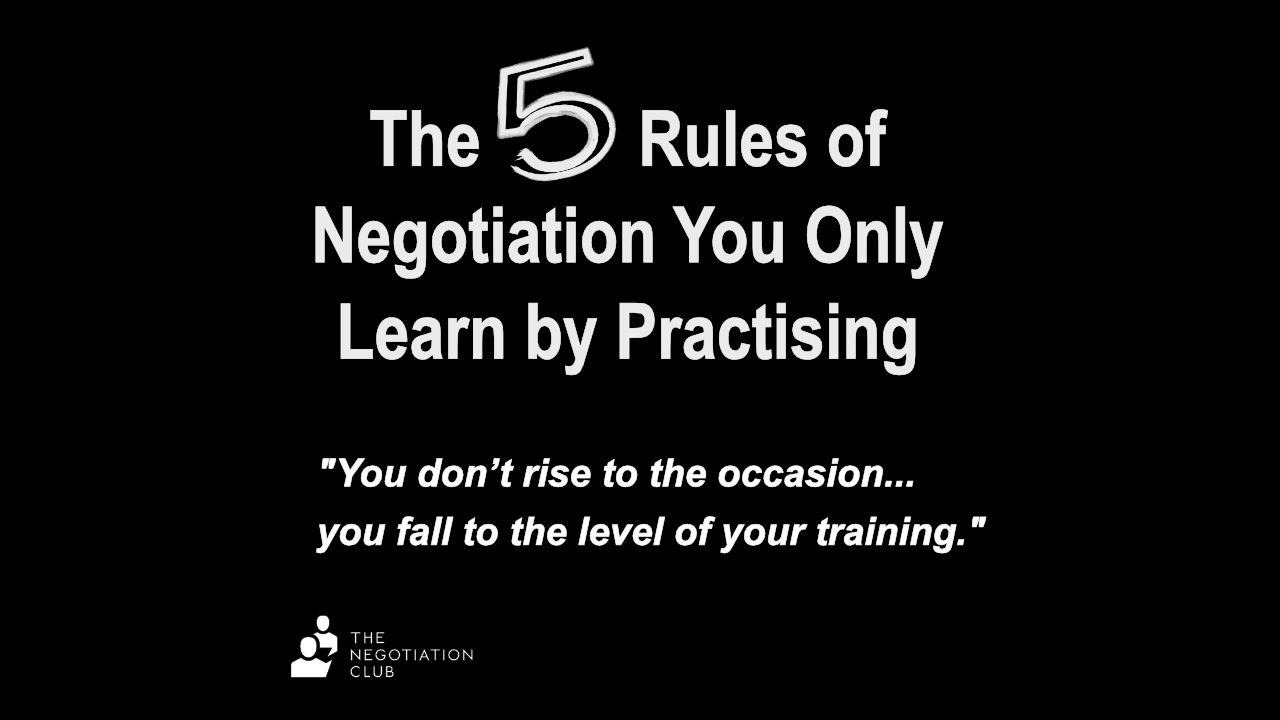
The 5 Rules of Negotiation - That You Only Learn by Doing!
Negotiation is often described as a skill — but it’s more than that. It’s a practice. Like learning to ride a bike or play an instrument, it isn’t enough to read about it. You need to do it.
At The Negotiation Club, we champion one thing above all: practise. And in the thousands of negotiations we’ve seen — in workshops, competitions, clubs and coaching sessions — five core rules always rise to the surface. These are the rules that don’t just sit in textbooks; they come to life in action.
Here are the 5 rules of negotiation you can only truly understand through doing:
1. Preparation Isn’t Optional — It’s the Dealbreaker
Practise Preparation...
Use Negotiation Cards or a simple framework to rehearse your variables, limits and ideal outcomes.
Preparation is not about memorising a script. It’s about rehearsing how you’ll adapt. It means knowing your numbers, your priorities and your story — but it also means knowing theirs. Only through practising preparation in simulated negotiations do you truly understand how flexible, or fragile, your plan is under pressure.
“Most failed negotiations weren’t failed at the table — they were failed in the preparation beforehand.”
2. Silence is a Tactic — But Only if You Can Hold It
Practise Silence...
Run a negotiation where you’re only allowed one sentence at a time — and then you must pause.
Silence makes people uncomfortable. That discomfort creates pressure. But using silence strategically takes control and discipline — and it doesn’t come naturally. Practising silence in live negotiations helps you master timing, avoid oversharing, and let your counterpart reveal more than they intended.
"Practicing silence shows you what happens when the other side fills the gap… and sometimes, it’s exactly what you need to hear."
3. You’ll Only Spot the Signal If You’ve Seen It Before

IMAGE: Team Negotiations Are Ideal For Practicing Observation
Practise Observation...
Watch others negotiate and observe without participating. Then switch roles.
Most signals in negotiation are subtle — hesitation, changing tone, repeating variables. If you’ve never seen them in action, you won’t recognise them when they count. In our club, we run observer roles to sharpen this critical skill. Like watching a magician’s hands — the trick is in the details.
“Observation is the oxygen of negotiation — without it, your tactics are just guesses.”
4. Emotion Always Enters the Room — So Learn to Manage It
Practise Managing Emotions
Simulate negotiations that include deliberate emotional triggers — urgency, rejection, or even provocation.
You can’t “logic” your way through every deal. Rejection, ego, excitement — they all show up. Practising how to manage emotional responses is what separates a reactive negotiator from a resilient one. The more you expose yourself to emotional dynamics, the better you get at staying grounded.
Practice under pressure to learn how to stay calm under fire.
"You don’t rise to the occasion — you fall to the level of your training."
5. Your Style Matters — But Only If You Know What It Is

IMAGE: “Understanding negotiation styles begins by recognising that everyone negotiates differently — and practice helps you find your own.”
Practise With Your Style...
Repeat the same negotiation with different tactics — then reflect on what felt natural and what didn’t.
Your negotiation style is like your fingerprint — it’s unique, shaped by experience, personality, and instinct. But most people don’t know their style because they’ve never tested it. Practicing regularly helps you understand what works for you and how to build your own approach with confidence.
“You can borrow tactics, but you must own your style.”
You Don’t Learn to Negotiate — You Train to Negotiate
- Books give you the theory.
- Training gives you the techniques.
- But practice ... gives you the skill!
At The Negotiation Club, we’ve built everything around that belief. The only way to become a better negotiator is to negotiate — again, and again, and again.
So start today.... Pick one of the five rules... Practice it.... And then practice it again!
About the Author Philip Brown

Phil Brown is the founder of The Negotiation Club, a training organisation built on the belief that negotiation is a skill developed through practice, not theory. With 30 years of procurement and commercial experience, Phil now helps professionals worldwide build confidence and fluency through structured, repeatable negotiation practice. Experience Phils unique negotiation practice at a FREE NEGOTIATION TASTER ....



